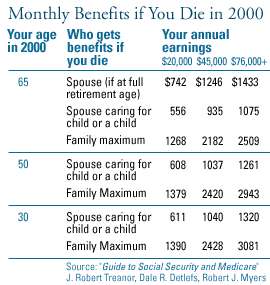|
Social Security after death
|
 |
February 2, 2000: 12:55 p.m. ET
Most people don't realize that their survivors could qualify for rich benefits
By Staff Writer Martine Costello
|
NEW YORK (CNNfn) - Most people assume they won't get much money from Social Security -- but a quirk in the law says their loved ones may get a healthy monthly check if they die.
Depending on your salary, how long you've worked, and how old you are when you die, your spouse and children can qualify for Social Security survivor benefits that in some cases will be more than the amount you would have received.
In some cases, a disabled adult child, a parent, even an ex-spouse can qualify, according to the rules. Best of all, the money is tax-free, for life.
"It's unbelievable what survivors get," said Andrew Pincus, a tax manager at M.R. Weiser, a tax accountant and consulting firm in New Jersey. "It's a lot more expansive than people think."

Survivor benefits grew out of a belief that if the main breadwinner died, the government would take care of the family, retirement experts said. The rules date back to when Social Security first began under the administration of President Franklin D. Roosevelt.
It means if you're collecting $722 a month from Social Security based on a salary of $20,000 and you die at 65, your wife will get $742 a month in survivor benefits if she's retired. It doesn't even matter if she earns a lot more than you do.
It also means if you die at 30 while earning $60,000, your spouse and your child could each get $1,174 a month, up to a family maximum of $2,741.
Who qualifies
In order for your relatives to qualify for full survivor benefits, you must be "fully insured," meaning you worked and paid into Social Security for a certain amount of time. The younger you are when you die, the shorter the time requirement.
So if you die at 28, you must have worked for a year and a half. For somebody born before 1930, you must have worked for 10 years. Someone in the middle -- let's say he's 42 -- would have to work for five years.
The higher your salary, the bigger the benefit. The benefits max out for people who make above $72,600. By law, Social Security takes 6.2 percent of your annual paycheck up to $72,600.
"This is an anomaly of the system," said Ira Siegler, a principal at PricewaterhouseCoopers in New Jersey.
Another quirk in the rules is that your survivors could get more cash from Social Security if you worked for five years instead of 30 years because of the way the government calculates your average annual salary, Siegler said. The reason is that if you're older, you have a lot of years during which your salary was a lot lower than today's pay scale.
Here are the three major types of survivor benefits, according to Pincus:
- A widow, widower or former spouse. The widow or widower must be unmarried, unless over age 60, to get partial benefits; and must be 65 to qualify for full benefits. The surviving former spouse must have been married to you for at least 10 years, and be single unless over age 60. So it's possible in some cases that a spouse and a former spouse could get 100 percent of the survivor benefits if you die.
- Surviving unmarried children under the age of 18, or disabled adult children, who qualify for 75 percent of your Social Security benefit.
- Surviving dependent parents, provided they are at least 62. So it's possible in some cases you'd have both parents over 62 each getting 75 percent of your Social Security benefit.
To see if your survivors would qualify for the benefit, you can call Social Security at 1-800-SSA-1213 or check the estimated benefits form you'll get around your next birthday.
"It really is amazing," Pincus said. "Most tax professionals probably would not be aware of it." 
|
|
|
|
|
 |

|

